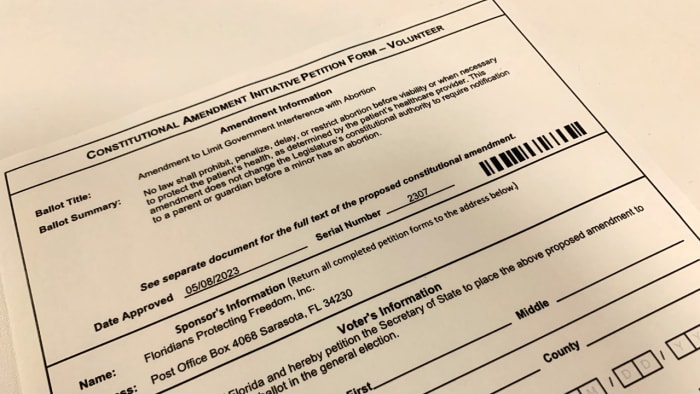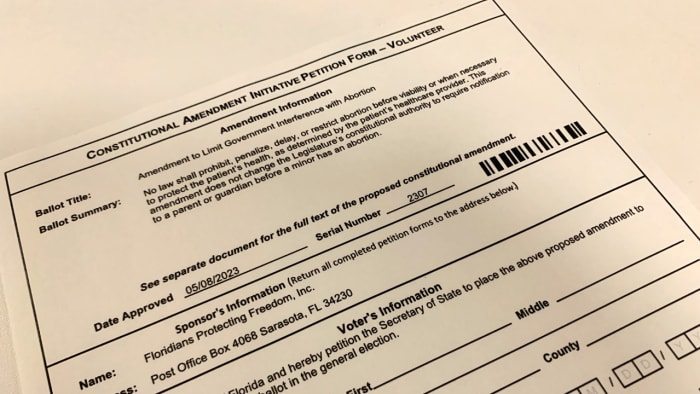Share this @internewscast.com

TALLAHASSEE, Fla. – Building on a years-long effort to make it harder to change the state Constitution, the Florida House on Thursday approved a controversial measure that would impose new requirements on the ballot initiative process and increase penalties for wrongdoing.
One of the most-contentious parts of the bill (HB 1205) would shorten from 30 days to 10 days the length of time signature gatherers would have to submit petitions to supervisors of elections and would increase penalties for late-filed petitions. The proposal also would require voters to provide identifying information, such as their driver’s license numbers, when signing petitions.
Democrats and voting-rights groups argue the proposed changes would place virtually impermeable roadblocks in the state’s initiative process.
[2025 ANNUAL SESSION: See what new bills Florida lawmakers are working on]
The proposal would prohibit felons who have not had their voting rights restored and people who are not U.S. citizens or Florida residents from “collecting or handling” signatures. Groups would need to conduct background checks on potential workers, who couldn’t be paid until they are successfully screened and registered with the state.
Groups that violate the prohibitions would face $50,000 fines. Critics maintain the part of the bill about “collecting or handling” signatures is vague and could expose initiative backers to huge fines. The “collecting and handling” terminology also has been the subject of litigation about recent laws affecting voter-registration groups.
Bill sponsor Jenna Persons-Mulicka, R-Fort Myers, said the state’s ballot initiative system “is broken,” and the proposed changes aim to fix what she called a “quality control problem.”
[RELATED: How to find, contact your Florida state senators or representatives]
She said the measure addresses a report by the state Office of Election Crimes and Security that found instances of alleged fraud and identity theft involving two 2024 initiatives.
“We’ve seen widespread and rampant fraud in this state in this process. We have evidence that we can’t turn a blind eye to. We must take further action,” Persons-Mulicka said.
But in opposing the bill, Democrats pointed to a number of initiatives that have received voter approval, including raising the minimum wage, ensuring free pre-kindergarten for children and restoring voting rights to felons who’ve completed their sentences. Advocates for those constitutional amendments turned to the initiative process because lawmakers refused to enact the changes, Democrats repeatedly argued Thursday.
“The process is working. It is not broken. The bad actors are being caught. Stop putting up these hurdles and protect the people,” Rep. Robin Bartleman, D-Weston, said.
The legislation equates to “a death knell for our citizen-led ballot initiatives in Florida,” Rep. Lindsay Cross, D-St. Petersburg, said.
“This process is already timely, expensive and a very heavy lift. Well, this bill will take the bar from very high to all but impossible,” she added.
The plan, in part, is rooted in intense ballot fights last year about proposals that would have put abortion rights in the state Constitution and allowed recreational marijuana use for adults. Backers of the proposals spent more than $100 million on each of the initiatives, which fell short of garnering the 60% voter approval needed to pass.
Gov. Ron DeSantis has made a crackdown on the initiative process, which is included in the Florida Constitution, one of his main priorities for the 2025 legislative session. The governor unleashed the power of his executive agencies to help defeat the abortion and marijuana proposals.
Rep. Griff Griffitts, R-Panama City Beach, urged House members to support the bill.
“The Constitution shouldn’t be easy to change,” Griffitts argued. “The integrity is gone. Corporate interests have driven this debate. The money has driven this debate.”
But Democrats argued that Florida already has one of the country’s strictest ballot-initiative processes. In addition to the 60 percent threshold, past changes in state laws, for example, have banned groups from paying workers by the signature, an industry standard widely used in other states. The bill would make it a felony for groups to pay employees per signature.
“They are trying to make it impossible for everyday Floridians to put citizen-led amendments on the ballot. They don’t want us to be able to directly pass policies that we know our communities need,” Amy Keith, executive director of Common Cause Florida, told reporters before Thursday’s House floor session.
The House approved the bill along party lines in a 76-31 vote. A similar Senate bill (SB 7016) is expected to go before the Senate Fiscal Policy Committee on Tuesday.
The House bill also would require the Office of Elections Crimes and Security to investigate if more than 10% of submitted petitions during any reporting period are deemed invalid. Supporters of proposed constitutional amendments often submit more signatures than are needed to get on the ballot, with the expectation that some will be rejected. The proposed 90 percent validation rate poses a virtually insurmountable hurdle, critics argue.
The measure would allow any voter to challenge the certification of ballot placement in circuit court and give the Legislature more power to carry out constitutional amendments that pass.
“If the text of a constitutional amendment proposed by initiative does not define the terms of art used throughout the amendment or describe any newly created rights, requirements, prohibitions, or authorizations, the Legislature is presumed to have the authority to define such terms and describe such rights, requirements, prohibitions, or authorizations,” the bill says.
The bill also would require supervisors of elections to notify voters who signed validated petitions and inform them of their right to revoke their signatures, a provision critics say is meant to encourage voters to withdraw their signatures and would drive up costs.
The proposal also would require sponsors of initiatives to post a $1 million bond after they have collected 25 percent of the necessary signatures to get on the ballot, to cover any potential fines. In addition, the bill would make it a felony for people to fill out missing information on petitions. Persons-Mulicka said the restriction is aimed at preventing groups from using pre-filled petitions.
















